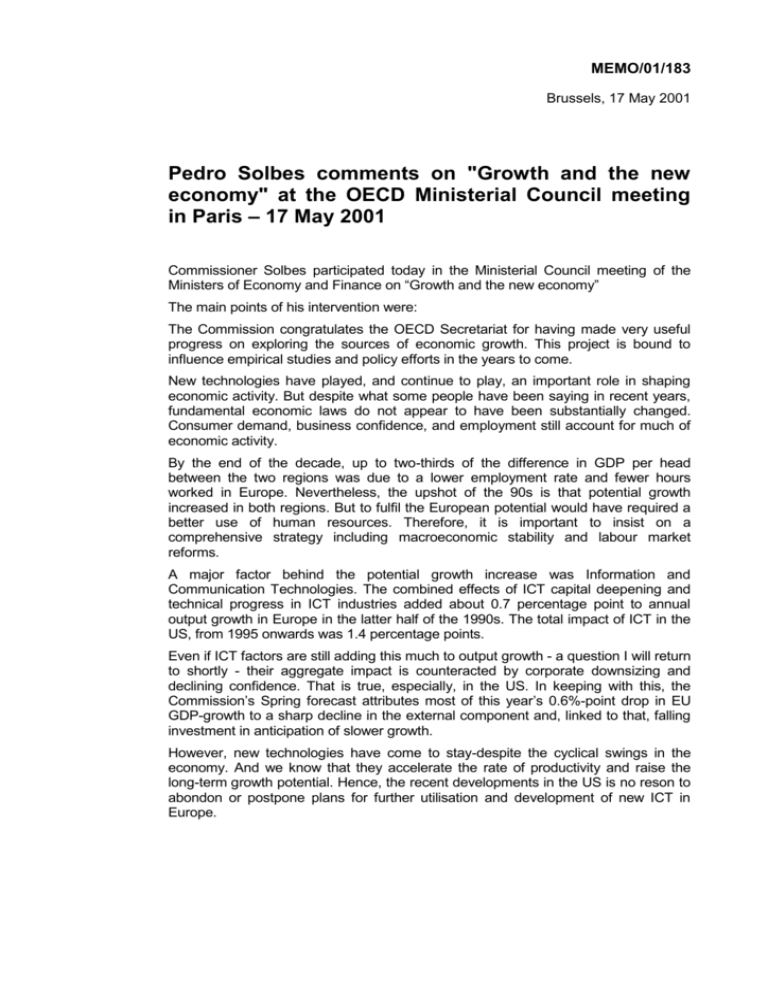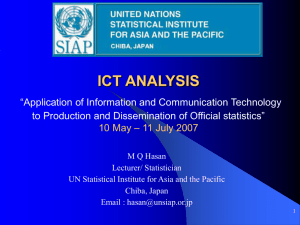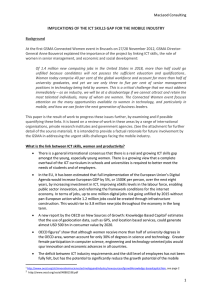DOC - Europa
advertisement

MEMO/01/183 Brussels, 17 May 2001 Pedro Solbes comments on "Growth and the new economy" at the OECD Ministerial Council meeting in Paris – 17 May 2001 Commissioner Solbes participated today in the Ministerial Council meeting of the Ministers of Economy and Finance on “Growth and the new economy” The main points of his intervention were: The Commission congratulates the OECD Secretariat for having made very useful progress on exploring the sources of economic growth. This project is bound to influence empirical studies and policy efforts in the years to come. New technologies have played, and continue to play, an important role in shaping economic activity. But despite what some people have been saying in recent years, fundamental economic laws do not appear to have been substantially changed. Consumer demand, business confidence, and employment still account for much of economic activity. By the end of the decade, up to two-thirds of the difference in GDP per head between the two regions was due to a lower employment rate and fewer hours worked in Europe. Nevertheless, the upshot of the 90s is that potential growth increased in both regions. But to fulfil the European potential would have required a better use of human resources. Therefore, it is important to insist on a comprehensive strategy including macroeconomic stability and labour market reforms. A major factor behind the potential growth increase was Information and Communication Technologies. The combined effects of ICT capital deepening and technical progress in ICT industries added about 0.7 percentage point to annual output growth in Europe in the latter half of the 1990s. The total impact of ICT in the US, from 1995 onwards was 1.4 percentage points. Even if ICT factors are still adding this much to output growth - a question I will return to shortly - their aggregate impact is counteracted by corporate downsizing and declining confidence. That is true, especially, in the US. In keeping with this, the Commission’s Spring forecast attributes most of this year’s 0.6%-point drop in EU GDP-growth to a sharp decline in the external component and, linked to that, falling investment in anticipation of slower growth. However, new technologies have come to stay-despite the cyclical swings in the economy. And we know that they accelerate the rate of productivity and raise the long-term growth potential. Hence, the recent developments in the US is no reson to abondon or postpone plans for further utilisation and development of new ICT in Europe. While the aggregate effects of ICT spending are fairly conspicuous, the gestation period is more drawn-out for complementary, yet more intangible investments. Thus, before a firm can expect the synergies from ICT usage to kick in, it must succeed in acquiring management capabilities, good worker skills, the right equipment and all of its business processes must be synchronised. In the aggregate, the putting together of this jigsaw puzzle of capabilities illustrates how critical it is that firms have access to the right resources when they need them. In Europe, we have responded to this challenge by co-ordinating a comprehensive strategy for success in the Knowledge based Economy. Over and above a stable macroeconomic policy-mix and structural reforms that facilitate job creation and boost competition, this strategy puts in place policy initiatives that are very much in line with the recommendations in the “Ministerial Paper on Growth”. The eEurope Action Plan is supposed to bring cheaper and faster Internet access and heighten citizens’ “digital literacy”. The Strategy for Jobs in the Information Society is designed to make sure that Europe develops the right ICT skills. The Risk Capital Action Plan aims at infusing more dynamism in risk capital markets. And, the strategy for a European Research Area facilitates cross-border networking in research. Finally, let us not forget that January 1st will see the introduction of euro notes and coins, which in itself should tie Europe closer together. With these developments under way, Europe is, in my opinion, ready to seize the opportunities offered by the “New Economy”. 2








